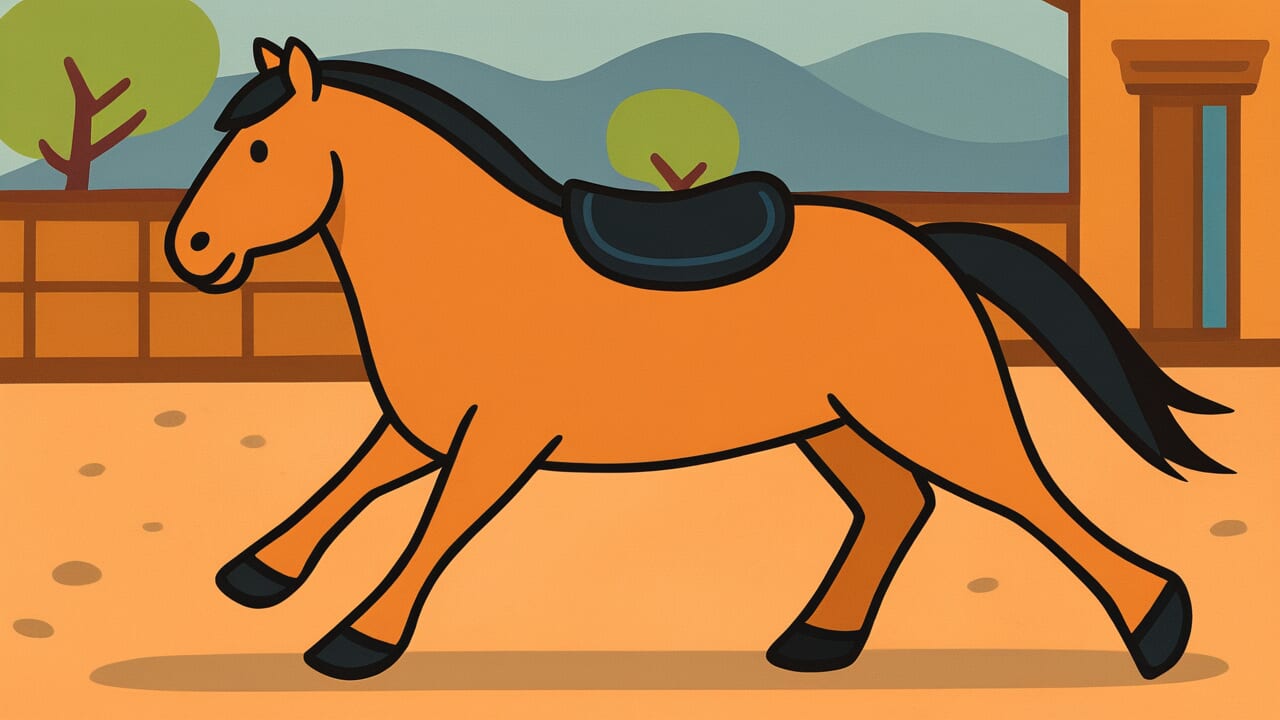How to Read “A fine horse hesitating is not as good as a poor horse walking steadily”
Kiki no kyokuchoku suru wa doba no anpo ni shikazu
Meaning of “A fine horse hesitating is not as good as a poor horse walking steadily”
This proverb means that while a talented person hesitates to take action, an ordinary person who keeps working steadily will achieve better results.
It teaches that high ability alone doesn’t guarantee success. Taking action and continuing to move forward matters more.
You can use this proverb to encourage talented people who are too cautious to act. It also gives courage to people who lack confidence in their abilities.
It helps when someone seeks perfection so much that they can’t take the first step. The proverb reminds them that starting matters more than perfect preparation.
Today, people use it in startup culture and learning contexts. It emphasizes the value of beginning now rather than waiting for perfect readiness.
Origin and Etymology
This proverb likely comes from ancient Chinese classics. “Kiki” refers to a legendary fine horse that could run a thousand miles in one day.
“Doba” means a slow, ordinary horse. “Kyokuchoku” describes stamping feet without moving forward. “Anpo” means walking with steady steps.
Ancient Chinese texts often compared excellent horses with ordinary ones. They used this contrast to teach about talent and action.
The lesson is clear: no matter how talented you are, if you hesitate and don’t move, someone less talented but steadily walking will pass you.
The proverb probably came to Japan along with classical Chinese literature. The exact time and details of its arrival remain unclear.
However, this teaching about action over ability was widely accepted in Japan. The contrast between talented people who can’t act and ordinary people who keep moving forward carries a universal message.
This message resonates with people across different eras and cultures.
Interesting Facts
The “kiki” mentioned in this proverb was also the name of legendary horses in ancient China. Their speed was described at mythical levels.
People said these horses could run a thousand miles in a single day, an incredible distance.
The “doba” wasn’t just slow. It referred to practical horses used for farming and carrying loads in daily life.
These horses lacked glamour but were essential workers supporting people’s lives.
Usage Examples
- He has talent but is too cautious. A fine horse hesitating is not as good as a poor horse walking steadily, so an ordinary person like me got results first.
- While worrying about creating the perfect proposal, a fine horse hesitating is not as good as a poor horse walking steadily, and another company entered the market first.
Universal Wisdom
This proverb has been passed down because it sharply points out a fundamental human contradiction. The more talented people are, the more cautious they become because of that talent.
They seek perfection so much that they can’t move. Meanwhile, people who know their limits can steadily progress within their capabilities.
This ironic truth never changes across time.
Talented people hesitate because they fear failure. The greater the expectations, the greater the anxiety about disappointing those expectations.
The pressure of “I have this much ability, so I must do it perfectly” actually prevents action. On the other hand, people who see themselves as ordinary have less to lose.
They can challenge things more easily.
In life, perfect timing or perfect preparation doesn’t exist. While you wait, opportunities pass and times change.
Our ancestors understood that action matters more than talent, and continuity matters more than perfection. These qualities ultimately lead people to their destination.
This wisdom holds even deeper meaning in our modern world that emphasizes ability so strongly.
When AI Hears This
In optimal control theory in engineering, bang-bang control is mathematically the best solution. To get a rocket or machine to its destination fastest, you instantly switch between maximum and minimum output.
You accelerate at full power, then brake at full power the next moment. This is theoretically the fastest method.
However, factories and transportation systems rarely use this approach. Why? Because energy consumption becomes enormous, mechanical wear intensifies, and failure rates skyrocket.
Think about cars. Repeating full acceleration and full braking might increase average speed. But fuel efficiency becomes terrible, brake pads need constant replacement, and the engine breaks down quickly.
Practical control systems choose constant-output steady control instead. It doesn’t achieve maximum speed, but energy efficiency is good, system lifespan is long, and performance is predictable and stable.
This is called “total efficiency.”
What makes this proverb fascinating is that ancient Chinese people saw this paradox without equations. They understood that time-integrated total performance matters more than instantaneous maximum ability.
This insight is exactly the principle that modern control engineering took hundreds of years to prove mathematically.
Lessons for Today
This proverb teaches you the importance of having courage to start with what you can do now, rather than stopping to aim for perfection.
You might see others’ success on social media and feel you’re not ready yet. But during that preparation period, time flows and opportunities shift.
What matters isn’t overestimating or underestimating your abilities. It’s taking the one step you can take right now.
That step can be small. If you want to write a blog, publish one article instead of aiming for perfect writing.
If you want to learn a new skill, open the book you have instead of endlessly searching for the best materials.
The talent inside you affects the world only when it takes the form of action. While you hesitate, people who walk steadily keep moving forward.
Even if it’s not perfect, the step you take today will definitely move tomorrow’s you forward.



Comments